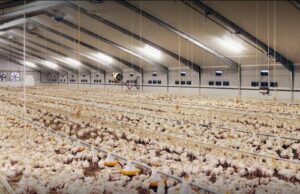
The Council of the European Union (EU) has adopted a regulation allowing for temporary trade liberalisation and other trade concessions with regard to certain Ukrainian products.
“We proposed it as a temporary measure, and it will make it easier for Ukraine to continue trading in the face of Russia’s aggression and will provide overall support to the Ukrainian economy,” Executive Deputy Chairman of the European Commission Valdis Dombrovskis said, commenting on the decision adopted by the EU Council on Tuesday.
The decision will suspend tariffs, which are still in place under the 2017 the Association Agreement between the EU and Ukraine establishing a deep and comprehensive free trade area (DCFTA), which liberalized much of the trade.
The suspension covers notably: industrial products subject to duty phase out by the end of 2022, fruits and vegetables subject to the entry-price system, and agricultural products and processed agricultural products subject to tariff-rate quotas, the collection of anti-dumping duties on imports originating in Ukraine, and the application of the common rules for imports with respect of imports originating in Ukraine.
The European Commission’sproposal has already been approved by the European Parliament, the law will enter into force after publication in the Official Journal of the EU.
Dombrovskis also said that the ministers of economy and finance of the EU countries discussed the European Commission’s proposal for short-term relief and long-term reconstruction, and more specifically, our proposal for an exceptional macro-financial assistance programme of EUR 9 billion. He said that “there was broad – in fact unanimous – support for a continued need to provide necessary support to Ukraine to face this aggression.”

Agroholding MHP, the largest producer of chicken in Ukraine, and in April 2022 due to the Russian military invasion of Ukraine reduced its production by 12% compared to April 2021 – up to 55.5 thousand. tons, and its sales – by 40%, up to 35 thousand. tons.
At the same time, foreign sales of chicken fell by 55% to 14.3 thousand. tons, while the Ukrainian market decreased by 20% to 20.7 thousand. tons, the company said on the London Stock Exchange on Tuesday.
Thus, the share of chicken exports in April 2022 decreased by 14 percentage points compared to April 2021 – from 55% to 41%. The average selling price of poultry meat increased by 18% to $ 1.8 / kg.
MHP also reduced the production of meat products and semi-finished products by 67% – from 4.44 thousand. tons in April 2021 to 1.45 thousand tons in April 2022.
“In March, due to the closure of ports, MHP recorded a significant decline in exports of poultry and vegetable oils. Since April, the company has been actively developing alternative routes to resume exports. In addition, the company’s local team has focused on improving poultry sales in Ukraine by optimizing logistics and sales channels, “the agricultural holding said in a statement.
In turn, in April, the agricultural holding doubled sales of sunflower oil compared to the same period last year, to 17.3 thousand. tons, and 30 times compared to March 2022, when export logistics from Ukraine were disrupted due to the Russian military invasion and blockade of its seaports by Russian ships.
MHP in April sold 2% less soybean oil than in April 2021 – 4.3 thousand. tons. However, this figure is 19% higher than soybean oil exports in March 2022.
“Spring sowing is completed on time and within the budget. Winter crops – wheat, barley, rapeseed – are in good condition. The company has access to all necessary PPE, pesticides and fertilizers, which are expected to be applied in a timely manner and in full,” the agricultural holding concluded. work in April.
MHP is the largest producer of chicken in Ukraine. Also engaged in the production of cereals, sunflower oil, meat products. MHP supplies the European market with chilled chicken carcasses, which are processed, including at its plants in the Netherlands and Slovakia. In February 2019, the agricultural holding completed the acquisition of the Slovenian company Perutnina Ptuj.
MHP in 2021 received $ 393 million in net profit against $ 133 million in net loss in 2020, and its revenue grew by 25% to $ 2.37 billion.
The founder, majority shareholder and head of the board of MHP is a Ukrainian businessman Yuri Kosyuk.

Germany plans to stop importing Russian coal by autumn, this will be possible at the expense of other suppliers, including South Africa.
“This is something that is quite real,” German Chancellor Olaf Scholz told reporters on Tuesday in Pretoria, where he is visiting. He is quoted by the German media.
Earlier in April, during a visit to Latvia, German Foreign Minister Annalena Berbock said that Germany would gradually stop buying Russian energy resources, in particular, by the end of the year it would completely stop importing Russian oil. From coal imports, Burbock said, it is planned to stop before the end of the summer.

Ukrainian Foreign Minister Dmytro Kuleba will visit Switzerland and Liechtenstein from May 24 to 26, where he will take part in the World Economic Forum in Davos and hold a number of bilateral meetings, the Ministry of Foreign Affairs of Ukraine has said.
In particular, Kuleba will meet with President of Switzerland Ignazio Cassis and Crown Prince of the Principality of Liechtenstein Alois. In addition, meetings are scheduled with the Prime Ministers of Greece and Ireland, as well as the Foreign Ministers of Peru, Costa Rica, Austria and Liechtenstein.
On Wednesday, May 25, the minister will also communicate with representatives of foreign media.

The Council of European Union has adopted two assistance measures under the European Peace Facility (EPF) that will allow the EU to further support the capabilities and resilience of the Ukrainian Armed Forces to defend the territorial integrity and sovereignty of the country, and protect the civilian population against the ongoing Russian military aggression.
“After having adopted three tranches of support totaling EUR 1.5 billion this year, a fourth tranche will add EUR 500 million to the resources already mobilised under the EPF for Ukraine, thereby bringing the total amount to EUR 2 billion, ” the press service of the EU Council said.
“The history of tomorrow is being written today, on the battlefields of Ukraine. With these EUR 500 million, the EU has allocated a total EUR 2 of billion to support EU member states’ supplies of military equipment to the Ukrainian Armed Forces. This support is just one part of European efforts to help Ukraine defend itself. The EU and its member states are determined to continue. We have done it since the beginning of the war and we will continue until the end,” Josep Borrell, High Representative for Foreign Affairs and Security Policy, said.
It is noted that the scope of the equipment to be provided in the new support package is in line with the current priorities as expressed by the Ukrainian government. In this light, the assistance measures consist of EUR 490 million for military equipment designed to deliver lethal force for defensive purposes, as well as EUR 10 million intended to cover the provision of equipment and supplies, such as personal protective equipment, first aid kits, and fuel.

Finance Minister Serhiy Marchenko and KfW Director for Eastern Europe, Caucasus and Central Asia Olaf Zymelka have signed an agreement on a EUR150 million loan for 15 years for budgetary support, the Ministry of Finance reported.
“The funds raised will ensure stable financing of priority areas and will be used for social spending, education and healthcare,” Marchenko said.
The loan is provided as co-financing of the International Bank for Reconstruction and Development (IBRD)’s Supplemental Financing of the Economic Recovery Development Policy Loan. The grace period with a deferral of repayment of the principal amount of the loan will be five years.